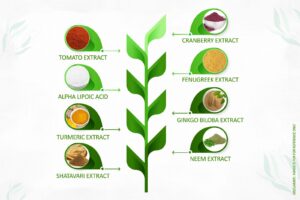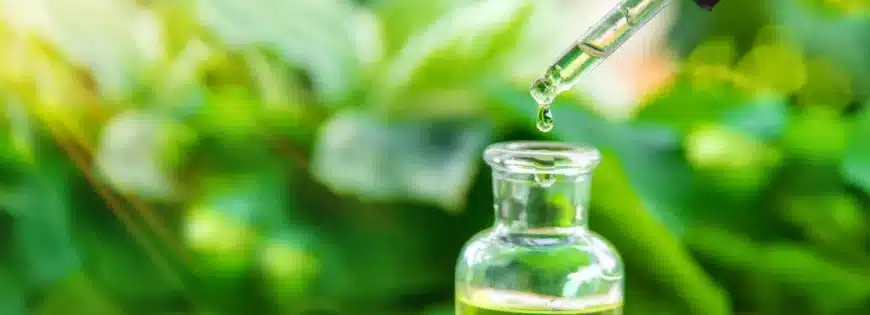Anti Inflammatory and Antioxidant Properties of Plant Extract
For thousands of years, plants have been a vital source of traditional medicines used to treat a wide range of ailments. Today, scientific research is increasingly focused on harnessing the therapeutic potential of natural plant compounds. In particular, plant extracts show great promise for combating inflammation and oxidative stress—two underlying processes linked to numerous chronic diseases. 1
Plant extracts, taken from different parts of plants, act like saviors for our well-being, helping with issues like diabetes, heart problems, brain diseases, and even cancer. They don’t just stop there- they also work to maintain a happy and healthy gut. 2
Immunomodulation and Inflammation Control:
Plant consumption helps the body to get stronger and reduces problems caused due to allergens and weak immune system or persistent inflammation. Through the downregulation of pro-inflammatory cytokines, cyclooxygenase (COX), and the inhibition of nuclear factor-kappa B (NF-kB) translocation to the nucleus, plant extracts offer protection against inflammatory processes. 2
Botanical extracts’ bioactive components are also essential for controlling oxidative stress, re-establishing equilibrium in the generation of reactive oxygen species (ROS), and boosting cellular enzymes’ antioxidant potential. 2
The Anti-Inflammatory Power of Plants:

Inflammation is the body’s protective response to injury, infection, or disease. While acute inflammation serves a crucial role, chronic inflammation can become problematic and contribute to conditions like arthritis, asthma, cancer, heart disease, and more. Current anti-inflammatory drugs provide relief but can have adverse side effects, especially with long-term use. 1
Researchers are now actively exploring safer, plant-derived anti-inflammatory diet alternatives to conventional anti-inflammatory medications. Some key classes of plant compounds with anti-inflammatory properties include:
1. Flavonoids: Flavonoids are pigments that provide plants with their bright colors. They are found in fruits, vegetables, grains, herbs, spices, teas and more. Flavonoids possess antioxidant properties that protect cells from damage. They can also block enzymes that create chemicals that cause inflammation. Specific flavonoids like quercetin, luteolin, and kaempferol are very potent at reducing inflammation. 1
2. Alkaloids: Alkaloids contain nitrogen and are found in certain plant families. Some well-known alkaloids like morphine are used as powerful pain relievers. Research shows other types of alkaloids have the potential to relieve inflammation as well. 1
3. Saponins: Saponins are natural detergents found in many plants. They can interact with cell membranes and block inflammatory pathways. Saponins like glycyrrhizin from licorice root show anti-inflammatory effects similar to cortisone. 1
4. Tannins: Tannins are polyphenol compounds divided into two groups: hydrolyzable tannins and condensed tannins. They act as antioxidants and can inhibit inflammatory chemicals like cytokines. Tannins are found in many plant foods and give some fruits an astringent taste. 1
5. Terpenes: Terpenes make up the active compounds in essential oils from plants like eucalyptus, mint, clove, rosemary, and thyme. These natural hydrocarbon compounds can reduce swelling, fever, and pain. Alpha and beta amyrins are triterpenes with strong anti-inflammatory properties. 1
These phytochemicals target different enzymes and pathways to limit the production of inflammatory mediators like prostaglandins. By leveraging the medicinal benefits of plants, researchers hope to develop more effective and sustainable anti-inflammatory therapies with fewer side effects than existing drugs. 1
Plant Antioxidants for Combating Oxidative Stress:

When reactive oxygen species (ROS) and the body’s antioxidant defenses are out of balance, it can lead to cellular damage, which is known as oxidative stress. Since ROS are linked to many diseases, scientists are exploring plant-derived antioxidants as a therapeutic solution. 3
After the discovery of vitamin C, research into plant antioxidants accelerated. However, bridging the gap between laboratory antioxidant tests and real-world efficacy remains a challenge. Plants make antioxidants like vitamins, enzymes, and polyphenols for their growth, development, and protection against environmental stressors. Their complex secondary metabolites, especially phenolic antioxidant compounds, have exhibited antioxidant benefits in both labs and human studies. 3
More Than Inflammation: Other Uses of Plant Extracts:
These plant extracts are not just good for inflammation. They can also help with fertility, fight against bacteria that cause diseases, and reduce side effects from some medicines. For example, extracts from Pinus pinaster bark were powerful against bacteria, and leftovers from grapes (Vitis vinifera) were useful in oral care. It’s like plants have multiple talents for keeping us healthy. 2
Keeping Youthful with Antioxidants:

Polyphenols, a superhero compound, also have another power: they can help slow down aging. A study with rosemary flowers showed they can have anti-aging effects, giving us another reason to appreciate these natural wonders. It’s like nature’s way of keeping us youthful. 2 12
Protecting Our Brains and Nerves:
Polyphenols, found in plants, can also be good for our brains and nerves. They help with blood flow to our brain and may even prevent diseases that affect our nerves. Curcumin, from the root of Curcuma longa, has been used in Asian medicine for its anti-inflammatory and antibacterial properties and might be beneficial for nerve problems. It’s like plants have our back when it comes to brain and nerve health. 2
Anti-inflammatory and Antioxidant Properties of Herbal extracts:

1. Cranberry extract: Cranberries are antioxidant-rich and packed with polyphenols like anthocyanins. Health benefits include urinary tract health, cardiovascular support, cancer prevention, and combating various diseases. Emphasizing the need for further research on cranberry proteomics, polyphenol interactions, and formulation for functional foods and supplements. 4
2. Fenugreek extract: It has health benefits with antioxidants and anti-inflammatory effects. It fights harmful substances, reduces swelling, and boosts the body’s defense. 5
3. Ginkgo biloba extract: It is an ancient plant that offers diverse health benefits due to its rich bioactive components. It possesses various medicinal properties, such as anticancer, antioxidant, and anti-inflammatory effects, making it valuable in treating neurological, cardiovascular, and respiratory diseases. However, potential adverse effects and interactions with medications warrant further research for safe medicinal use. 6
4. Neem Extract: Neem (Azadirachta indica) exhibits antimicrobial properties, with azadirachtin in seeds inhibiting microbial growth. Neem’s ethanol extract demonstrates antibacterial activity against Staphylococcus aureus and MRSA. It acts as a potent antioxidant, with azadirachtin and nimbolide showing antiradical scavenging activity. Additionally, neem aids in cancer management by regulating cell signaling pathways and acts as an anti-inflammatory by modulating enzyme activities. 7
5. Tomato extract: It showcases potent antioxidant and anti-inflammatory activities. Tomatoes are rich in phytochemicals such as carotenoids (lycopene, phytoene, and β-carotene) and polyphenols (flavonoids, flavanones, and flavones) which combat oxidative stress and inflammation, contributing to potential health benefits and overall well-being. 8
6. Alpha Lipoic acid: It is often called the “universal antioxidant,” operates in both aqueous and lipophilic environments. It enhances antioxidant enzyme expression, aids vitamin recycling, and possesses anti-inflammatory properties. Clinical studies on humans and animals indicate potential benefits for cardiovascular diseases, obesity, inflammation, pain, and aging. 9
7. Turmeric extract: Curcumin, a pigment from turmeric, exhibits antioxidant and anti-inflammatory properties. Its preventive and therapeutic benefits are linked to countering free-radical-induced damage implicated in cancer, atherosclerosis, and neurodegenerative diseases. Curcumin’s anti-inflammatory effect involves inhibiting key enzymes like COX-2, LOX, and iNOS, offering potential chemopreventive effects against cancer and inflammatory disorders. 10
8. Shatavari extract: Asparagus racemosus, commonly known as Shatavari or Rak-Sam-Sib, belongs to the Liliaceae family. Found in shaded areas across Asia, Australia, and Africa, it contains steroidal saponins, including shatavarin I–IV. Asparagus racemosus root extracts exhibit diverse pharmacological activities, such as antiulcer, antioxidant, immunomodulatory, and anti-aging properties, making it beneficial for treating nervous disorders, dyspepsia, diarrhea, tumors, and inflammation. 11
The Road Ahead for Plant-Based Therapeutics
This growing area of research is unlocking the tremendous anti-inflammatory and antioxidant capacities found across the plant kingdom. From reducing chronic inflammation to neutralizing oxidative damage, plant extracts may lead to safer, more sustainable alternatives to current pharmacological treatments. With continued transdisciplinary efforts, scientists can tap into the secrets of medicinal plants for transformative healthcare innovations.
Note: While the provided information is based on credible references, we do not make any specific claims or guarantees. It is important to consult with your healthcare advisor for personalized advice and guidance related to your health.





